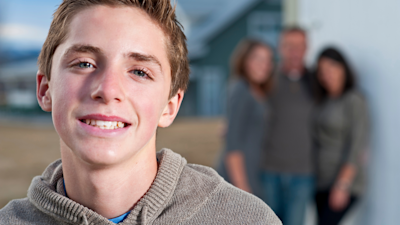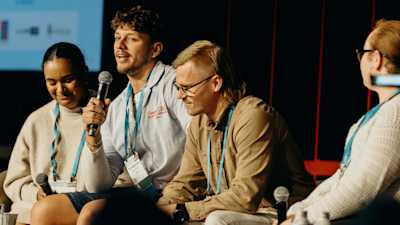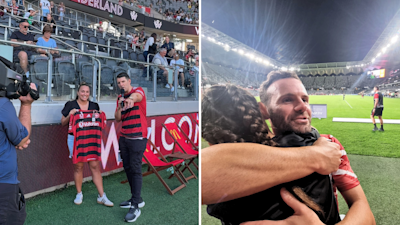Claire, a young person in care, is making the most of her time in her home to set herself up for a successful future.

Image: Claire, wearing a black t-shirt with her long brown hair in a high ponytail, stands at the stove cooking dinner.
Claire* recalled the first time she arrived at her new home. Ashleigh, her Supported Independent Living Services (SILS) house manager, had come to pick her up, and it was raining heavily. The weather mirrored her mood. She had just left the safety and comfort of the hospital where she had been for a long time.
“I didn’t want to come inside. I didn’t feel ready yet. It was a strange house in a strange place. And I did not know the people I was supposed to live with,” said Claire.
Claire and Ashleigh sat on the steps outside the house in the rain. Ashleigh was prepared to wait as long as Claire needed.
“We had been out there for three or four hours when this huge gust of wind came and took our umbrella. Ashleigh ran after it, but the umbrella kept running away. I felt bad for her, but it was so funny,” said Claire.
The runaway umbrella broke the ice, and Claire was ready to come inside. Claire and Sarah, the other young person living in the home, had moved into the home just as the CARE Program was introduced in Life Without Barriers in Queensland. CARE is an evidence-based, trauma-informed model adopted by Life Without Barriers across our child, youth and family programs. “We recruited all of our staff from a CARE perspective. We really made sure that everybody was CARE-aligned so that we could provide service from the start to be what residential care should be under the CARE framework," said Angela.
"Everything we do is with a trauma informed lens. And having family involved has been huge."
"We’ve got a relationship with Claire’s family, particularly her nan. Having her family come to the home and visit has been a beautiful experience for Claire and her family.” At first, Claire communicated with her care team mainly through writing text messages or handwritten notes. Her carers would write everything down for her, especially if they had to discuss something serious. Claire would then respond back in writing. Claire’s care team focussed on building trust and safety for Claire.
As Claire started to feel safe, she began to open up, which started with speaking a few words occasionally. The care team didn't rush the process because they recognised that Claire would open up when it was the right time for her. It took Claire two years before she was ready to speak openly.
“I started to feel secure because I had a stable environment, people who are committed to my wellbeing and who never give up on me."
"That no matter what, they are not going to judge me and will continue to support me. Then the big turning point for me was getting my first job,” said Claire. With support from her care team, she applied for a job at Mcdonald's and got it. However, her first shift was overwhelming.
“When I came home, I said, ‘I don’t want to do that again.’ I had to talk to too many people, and I was not ready,” said Claire. Mcdonald's could see the value Claire brought and wanted her to continue working for them. They made adjustments so she could do her job well, for example, giving her jobs that were not customer-facing. Claire’s confidence grew because she could see that someone else beyond her care team believed in her too.
It gave her the confidence to apply for a second job. This time, she completed most of the application herself and only turned to her care team to check the application. She was successful, and the process helped build Claire's self-efficacy and self-belief.
The more successful experiences young people have, with the support of caring adults around them, the more likely they are to engage in new activities and take healthy risks. Claire is now balancing the two jobs seamlessly. On her 17th birthday, Claire reflected on where she’s been and where she is going.
“In the past, I felt powerless. Now I realise how much power I actually do have," said Claire.
"I’m excited about my future because I believe I can achieve anything I truly put my mind to."
"I am thankful for everything I have, everything I have created for myself with the support of the people here. Now I want to make the most of the time I have here to set myself up to be the best I can be when I leave this house.” Angela, another member of Claire’s care team, is proud of how much Claire has grown and blossomed in just 12 months.
“Claire recently went to a Transition to Independence Day. 12 months ago, there was no way she would have approached service providers to talk about her future. But this time, she was walking up to anyone and just talked with confidence about her transition and what she wants for herself.
"She's going to do amazing things, and she’s reached this really beautiful place where she knows that,” said Angela. It’s been two months since her birthday, and Claire had been making the most of her time in the house, as she said she would. She attained her driving licence, bought herself a car with minimal help from her care team, and even researched the insurance she wanted.
Claire is keeping up with her two jobs successfully. She is usually not interested in cooking, but recently had been in the kitchen with her youth worker, preparing meals and learning things she wants to cook for herself when she leaves. Angela is confident that Claire is going to go far in life.
“Claire has the most beautiful sense of humour - incredible comedic timing – is extremely bright and talented at anything she wants to do. She is both willing and able to help herself now."
"Recently, she requested and chose a mental health provider. For the first time ever, she's ready to talk about her trauma, and to seek some help so that she can be in a position to be as successful as she wants to be,” said Angela. Renowned child development psychologist Urie Bronfenbrenner once said, “Every child needs at least one adult who is irrationally crazy about them.”
In Claire's case, she has an entire care team.
A person's story is precious. We take storytelling seriously. Sometimes people are able to tell their own story, and we love that. We always make sure they give us their ok, and we will always honour the trust placed in us to bring their story forward.
*Names have been changed to protect the children in this story.


